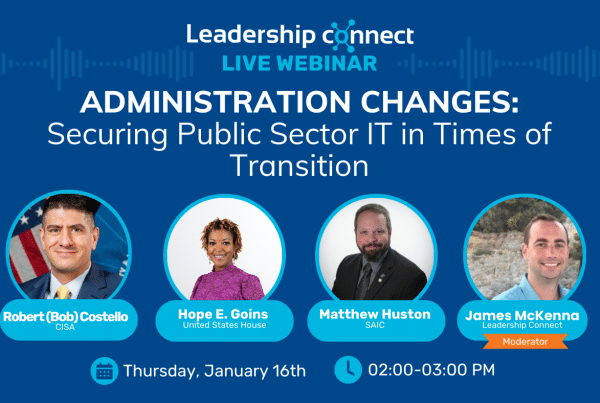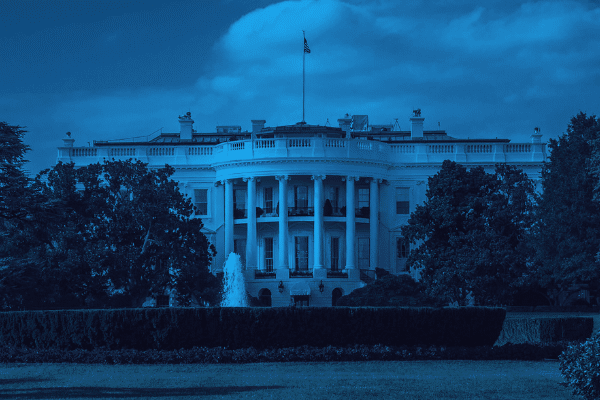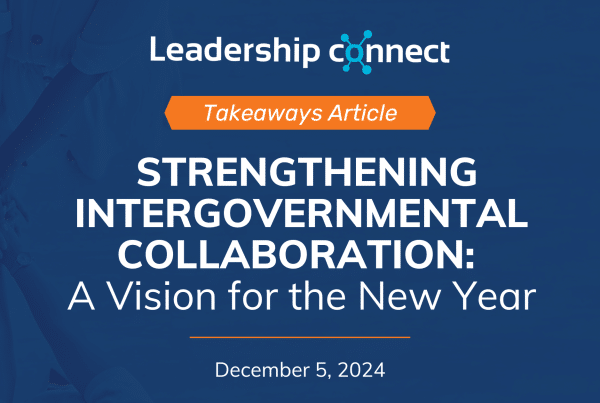In our latest webinar panel discussion, Leadership Connect invited policy professionals and industry experts to share their experiences and strategies for navigating the impacts of major news cycles. They discussed how these events affect their work and offered valuable insights into managing changes and challenges that our audience can adopt in their daily workflows. From practical strategies to understanding the broader implications for various sectors, our panel provided a wealth of knowledge that can help you stay ahead in the policy arena.

The panel touched on four major news topics: Election prep, Chevron decision, AI in policy, and coalition building. They gave their advice, reactions, concerns, and hopes for agencies and overall government collaboration specific to each topic. Missed the conversation? Read the key takeaways below and watch the recording here.
Election prep – how to anticipate and prepare for the changes to come
Derek: Changes in Congress, and more importantly, congressional committees, are going to happen no matter what. Derek explained that his approach is to anticipate shifts in memberships and target oversight committee members to educate them on how the agency fits into the broader operations of the government and make the case for why they are important. He stressed the value of bringing yourself to the forefront of their minds through education and open communication with impactful members.
Paul: Echoing what Derek said, Paul advised listeners to prepare as much as you can during this uncertain time. On the presidential election front, try to learn as much as you can about the future administration’s agenda toward your key area of focus, like healthcare in Paul’s case. This preparation helps you to hit the ground running the moment the winner is announced. On a similar note, he suggested prioritizing anticipated turnover on key congressional committees and doing your best to target those who are likely to remain so that your efforts are not wasted on those who may not return.
Ray: Ray had a different approach as he is currently focused on the broader issue of Latino voter registration and voter turnout numbers leading up to the election. This involves a concerted effort from local members to activate communities at the local level. He also explained that he is using this time to push for legislation and committee agendas that have an impact on the Latino community to try to make as much impact prior to the election.
Sean: Like his fellow panelists, Sean suggested using this time to prepare and expand your resources and create focus groups to get minds together to discuss anticipated topics that will be large issues based on potential election results.
Pro tip: Use Leadership Connect’s Advanced Search to zero in on the major players on Congressional Committees. Use “Relationship Maps” to uncover how your team is “connected” to any committee or office. Check out their org charts and study their profiles on Leadership Connect to familiarize yourself with their education, hometowns, family, or other personal notes that can make your conversation stand out to help them remember your policies and agencies’ impact.
Chevron decision – initial reactions, concerns, and future predictions
Derek: For Derek, his first reaction was to turn to legal counsel to understand what this means not only for his agency, but also for what their interactions with other agencies could look like in the future. They don’t expect it to impact their personal daily workflow, but even still, Derek advised that policy professionals should be prepared and knowledgeable about what is going on in the broader space regarding how the government will operate in the long run.
Paul: Paul admitted that the decision is causing a lot of uncertainty, but the consensus is that the power is leaving the agencies toward the courts and Congress. He is adopting a “wait and see” attitude about how this impacts Congress in their writing of legislation. He thinks that agency experts will have a hand in the writing of legislation given that Congress will now have to be much more specific and direct as they can no longer defer to subject matter experts after the legislation is written.
Ray: Overall, Ray stated that he agrees that the responsibility is more so on Congress now, which can in turn change the dynamics within the agencies. He also is worried about civil rights implications given this decision. Like Paul, he is committed to waiting and seeing and is focused on building up a strong legal team to carry his agency forward.
Sean: Sean expressed his worries about the implications because he and his team rely heavily on FDA regulations. He’s concerned about the potential prolonged period of uncertainty regarding availability of treatments for their members to distribute to their patients.
AI in policy – how they feel about it and if they are implementing it in workflows
Paul: Initially, Paul expressed some anxiety when it comes to AI, but the healthcare field has a long of optimism about the innovation of treatments and technology. He is trying to overcome that anxiety to make sure that AI in medicine doesn’t get regulated in a way that prevents helpful innovation for treatments and care.
Ray: LULAC is concerned about potential biases that are implicit in AI that could negatively impact the Latino community. He’s approaching the topic with caution and is starting to consider the guardrails that are necessary when implementing AI into policymaking.
Sean: Currently, Sean does not interact much with AI, but he and his team are keeping up with the broader issue of AI in medicine. They have not entered the medical lobbying spaces yet but are doing their best to keep themselves informed and prepared for when that day comes.
Coalition building – how to leverage and best practices working with partners
Derek: Speaking for elected officials, Derek stressed the need for coalitions in electoral politics. He recommended anticipating people dropping from coalitions and being mindful about where the coalition is fragile and strong and preparing to bring people back and how to do that. His top tip was to prepare coalitions well in advance of the next election.
Paul: His main piece of advice was to keep an open mind. You never know where a successful partnership will arise, so never discount anyone. Paul explained that there is real power in third party validation if you can find common ground with others in the space.
Ray: A problem that Ray is facing is a lack of partnership, especially in the immigration community. Resolving this issue requires a greater level of communication and deeper engagement with local businesses to understand the deeper implications of legislation and policy. Highlighting connections between groups to increase conversations and understand interests to find any crossover is the best way to start a successful coalition.
Sean: When building a partnership or coalition, Sean stressed the importance of establishing and defining a clear goal so that everyone is on the same page and knows their purpose. He also noted that you need to know when to disband the coalition when the goal is completed.
Pro tip: Leadership Connect can help identify new coalition partners and track the ones you care about. See how your team connects through biographical data. Track people changes to your coalition partners on a weekly basis. Organize your outreach all in one place.






